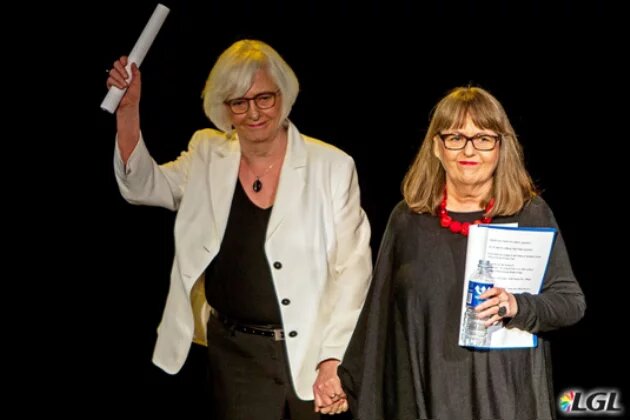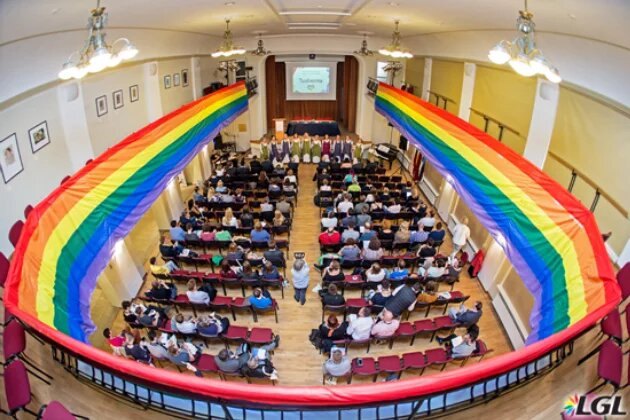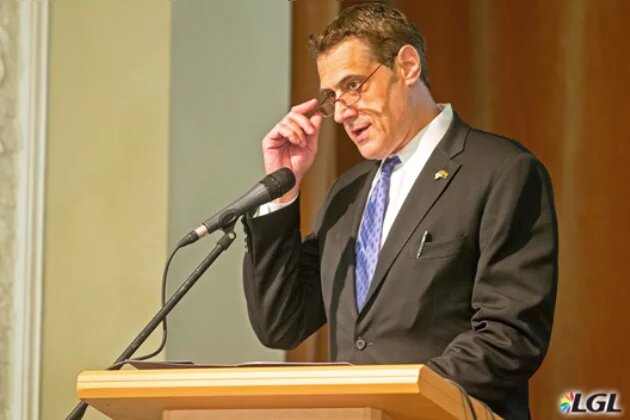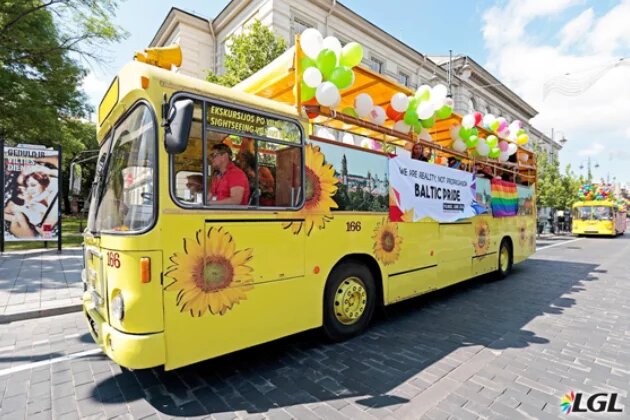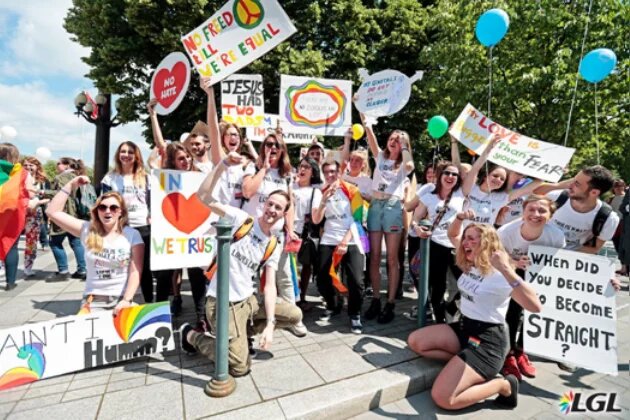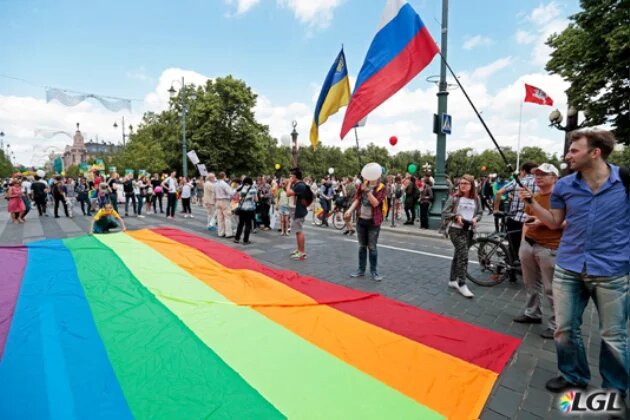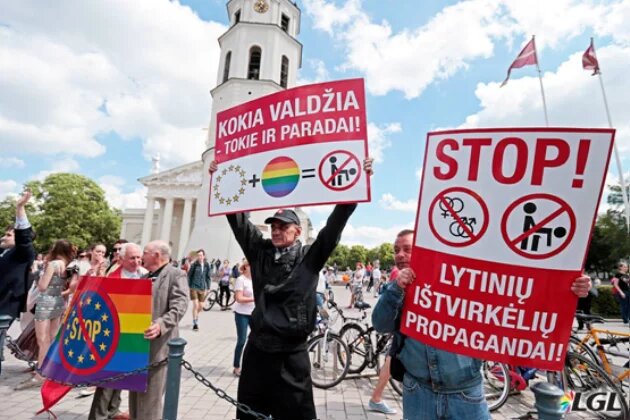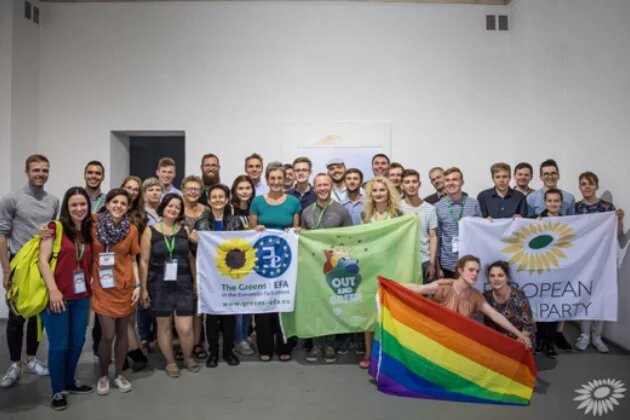
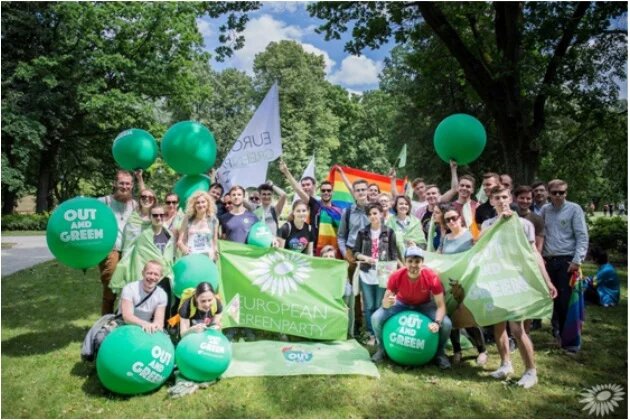
June has been famously dubbed "LGBT Pride Month" to commemorate the Stonewall riots, which took place in late June 1969 in Manhattan. Since then, the celebration of equality for all has grown in size and scope and spread to many countries and regions, including the Baltic States, where pride marches have been conducted with varying degrees of success since 2005, rotating among the three Baltic capitals, Tallinn, Riga, and Vilnius, the latter being home to the Baltic Pride 2016.
Baltic Pride week, whose principal slogan was "We Are People, Not Propaganda!", lasted from June 13 to 23 with the Pride March taking place on June 18 and a number of associated events conducted throughout principally organized by the Lithuanian National LGBT* Rights Organization (LGL).
#OutAndGreen
The European Green Party, in turn, attended the Baltic Pride with the Out And Green - European Queer Greens seminar, supported by MEP Terry Reintke, MEP Ulrike Lunacek, as well as MEP OrasTynkkynen, EGP Committee Member, and organized by an EGP team of young professionals led by VesnaJusup.
The seminar featured distinguished panels and engaging discussions on cooperation with and within LGBTIQ movements, where Tomas VytautasRaskevičius, LGL Policy Coordinator spoke about the LGBTI topic being predominantly regarded as "Western influence" in Lithuania, a notion very similar to the current public attitudes towards LGBTI issues in Georgia. However, this trend subsided in the face of certain geopolitical threats from Russia, something that has not yet been able to change Georgia's mind, since Russia is seen as an age-old associate with similar religious and traditional values. Participants highlighted the significance of publicity and visibility, although at times counterproductive, as the most effective tools to further the LGBTI agenda in the long run. The unequivocal value of allies in the movement was also underscored.
The second panel, opened by MEP Ulrike Lunacek, focused on repressive legislations and "green" responses, with the participation of Anne Nemsitsveridze-Daniels of Heinrich Boell Foundation South Caucasus, who gave a rundown of the present situation in terms of LGBTI legal rights and freedoms in Georgia and Armenia, as well as the differences and asymmetry between the two countries and the drawbacks of the anti-discrimination legislation in place in the former. She spoke also within the context of the three-year EU-funded action Solidarity Network for LGBTI in Armenia and Georgia, being currently implemented in cooperation with four regional partner organizations. She was then joined by colleagues representing the international film festival Side By Side, being conducted on a regular basis in Moscow and St. Petersburg. The Russian colleagues spoke about the string of repressive laws that have been enforced in Russia in the recent past: the "Law on Foreign Agents" (2012), which has forced many NGOs to commercialize, the "Law on Non-propaganda of Homosexuality among Minors" (2013), and, most recently, the "Law on Undesirable Organizations" (2015). Faced with these challenges, one of the only remaining avenues through which outreach to the LGBTI community and rights defenders is possible is the arts, which is the principal focus of the international film festival.
Pride Voices
The Baltic Pride events continued with the Pride Voices programme taking place at the Lithuanian Russian Drama Theater, with a handful of protesters camped outside with signs declaring Dostoyevsky's purported displeasure with the events of the evening.
The event consisted of a TEDx-style format, where impressive musical numbers alternated with inspiring and empowering personal stories of prominent political figures and activists, such as JóhannaSigurðardóttir, former Prime Minister of Iceland and the world's first openly lesbian head of government, her spouse, JónínaLeósdóttir, a renowned novelist and playwright, who told the story of their relationship and their struggle to enjoy equal rights as a same-sex couple; Ulrike Lunacek, Vice President of the European Parliament, co-President of the EP Intergroup on LGBTI Rights, head of the delegation of the Austrian Greens at the EP, and Austria's first openly lesbian politician; Wamala Dennis Mawejje, a Ugandan LGBTI activist, who outlined his efforts to advance the rights of the LGBTI community in Uganda, which passed an Anti-Homosexuality Act in 2013 but the ruled the Act invalid, including his work in LGBTI human rights and access to health; and Judy and Dennis Shepard, whose son, Matthew, was a victim of an anti-gay hate crime, which spurred the Shepards to engage in activism and promote the significance of allies in the movement.
International Conference on the Legal Recognition of Same-Sex Relationships
The Pride events continued on June 17 with an international conference titled Legal Recognition of Same-Sex Relationships: Emerging International Consensus and Local Opportunities, which featured a number of interesting panels comprising of high-level speakers and keynote addresses delivered by Stuart Milk, President of the Harvey Milk Foundation, and MEP Ulrike Lunacek. Mr. Milk's speech was especially impressive as he recounted how Dr. Maya Angelou stood up for him while he was attending hisuncle Harvey's vigil as a 17-year old.
Tanuya Munnoo, Provincial Manager of the South African Human Rights Commission, outlined the steps towards the recognition of same-sex relationships in South Africa, where, significantly, mutual respect and coexistence between church and state was achieved, stating, incidentally, that "Religious affiliations of some cannot determine the constitutional rights of others".
Ashley Fowler of the Human Rights Campaign spoke about the importance of messaging on the path towards marriage equality and highlighted the role of straight allies as messengers. She illustrated these points by referring to an HRC PSA that used references from the Bible to reach out to the religious community with the slogan "We Are All God's Children".
"Religious affiliations of some cannot determine the constitutional rights of others" – Tanuya Munnoo, Provincial Manager of the South African Human Rights Commission
Helen Kennedy, Executive Director of the EGALE Canada Human Rights Trust and a co-secretary of ILGA, outlined the current situation in terms of LGBTI rights, including the fact that 18% of all hate crime cases between 2010 and 2013, were SOGI-motivated; most of these were perpetrated by young people aged 16-24 at educational institutions; 74% of trans students are victims of hate-motivated violence; and up to 25% of all homeless in the country are LGBTI youth. Similarly to Georgia, SOGI-motivated hate crime victims are often subject to secondary victimization from law enforcement, and the legislation in place frequently is not in line with the level of societal and cultural acceptance.
The second panel focused on emerging European consensus on the legal recognition of same-sex relationships and was moderated by Dr. Alexander Schuster, Law Professor at the University of Trento and the attorney representing the plaintiffs in the historic case Oliari et al v. Italy, where the European Court of Human Rights found Italy in violation of Article 8 (Right to Private and Family Life) of the ECHR by not introducing a form of legal recognition of same-sex couples.During the plenary session, ErwannBinet, Member of the French National Assembly, notably asserted that “[One] can be Catholic and be pro-same-sex marriage”.
The 3rd and 4th panels focused on the possibilities and the existing situation in terms of recognition of same-sex relationships in Lithuania and the broader Baltic region, respectively. The subjects covered during these plenary sessions were especially relevant to Georgia and Armenia as they outlined the specific steps taken by former Soviet states towards the recognition of same-sex unions and set specific examples for countries, such as those in the South Caucasus. The speakers during these sessions included members of the Lithuanian, Estonian, and Latvian parliaments that have pushed for LGBTI-friendly legislation in their respective countries and highlighted the significance of identifying like-minded and relatively open politicians, or policy brokers, who can fight for the cause from within government institutions.
“[One] can be Catholic and be pro-same-sex marriage” - ErwannBinet, Member of the French National Assembly
As a response to a question from the representative of the South Caucasus Regional Office of the Heinrich Boell Foundation with regards to how to proceed if such policy brokers are difficult to identify in the Georgian government, and those that do have a stance on the issue,do not have sufficient decision-making capacity, ImreSooäär, Member of the Estonian Parliament suggested to involve opinion makers and public figures to spread the message of equality, which is likely to sway public attitudes.
Several campaigns and coalitions, such as the KOOS campaign, the Tolerant Youth Association and the Advocacy Coalition Framework of Lithuania were identified as crucial components of advancing LGBTI issues.
Final remarks for the event were delivered by the Minister of Culture and Democracy of Sweden, Alice Bah Kuhnke, who concluded her speech with the following statement: “None of us are free anywhere if some of us are not free somewhere”.
“None of us are free anywhere if some of us are not free somewhere” - Alice Bah Kuhnke, Minister of Culture and Democracy of Sweden
The March for Equality
The principal event of the Baltic Pride, the March for Equality, took place on June 18 and comprised delegations from various countries and regions, including Belgium, the United States, the United Kingdom, the three Baltic States, and etc. The European Green Party marched under Block 8 waving green balloons and flags. In a symbolic statement, the Rainbow Flag was seen waving among the flags of Russia and Ukraine. Even though prior to the march the participants were warned to prepare for stringent security checks, no such measures were carried out at the event. Police presence was minimal but stable and the general sentiment was overwhelmingly positive, with passers-by stopping to smile and wave at the marchers. There was a gathering of protesters wielding signs and posters; however, there were no derogatory remarks or any attempts at violent confrontation, something that would definitely have taken place in Tbilisi or Yerevan. Although, it is noteworthy that during the 2010 Baltic Pride, the marchers were greeted with a barrage of tomatoes and eggs and the situation was much more volatile, which is proof that positive change is possible.
Following the 1.6 km Pride walk starting from Lukiškės Square, the marchers arrive at the Bernardine Garden to listen to additional inspirational speeches from Stuart Milk, Ulrike Lunacek, Members of the Lithuanian Parliament, and Alice Bah Kuhnke, among others, who highlighted the magnitude of the event and its resonance throughout the Baltic states and the rest of the EU, reaching out to encourage the LGBTI community members and allies beyond European borders.
The Baltic Pride events were concluded with a concert featuring a number of LGBTI performers(including trans and dragartists, such as Dana International and LaDiva Live), a Pride Party and Pride Brunch, which left all of the participants and organizers with a positive, empowered, and hopeful outlook towards the future.
The knowledge and experience garnered at the Baltic Pride events fueled new ideas and approaches that can be potentially multiplied in the South Caucasus and utilized to enhance the Solidarity Network for LGBTI in Armenia and Georgia project to bring the two countries closer to reducing the level of homo/bi/transphobia, combating discrimination and recognizing equal rights for LGBTI persons.
